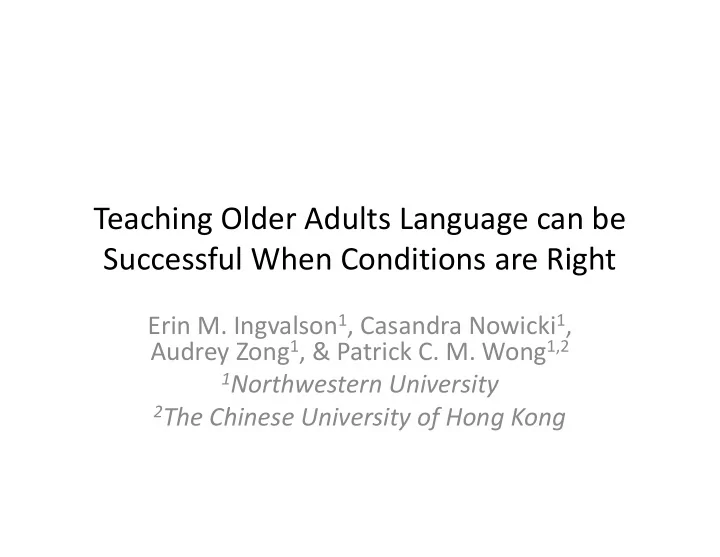

Teaching Older Adults Language can be Successful When Conditions are Right Successful When Conditions are Right Erin M. Ingvalson 1 , Casandra Nowicki 1 , Audrey Zong 1 , & Patrick C. M. Wong 1,2 1 Northwestern University 2 The Chinese University of Hong Kong
Second Language Learning • Second language learning is more difficult in later life • Several years of research have attempted to determine the most effective means of second determine the most effective means of second language training
High Variability Training • Natural speech tokens are used as training stimuli • Stimuli are produced by multiple native speakers speakers • Learners hear multiple tokens and multiple talkers during training • Feedback is given on each trial
Perrachione et al., 2011 Noting that individual differences in auditory and cognitive performance have been shown to predict second language learning performance, they investigated whether individual differences they investigated whether individual differences in pre-training performance interacted with training paradigm to influence learning.
PCPT – Pitch-Contour Perception Test • Two-alternative forced-choice tone perception • Performance on this test is correlated with Performance on this test is correlated with lexical tone learning
Training – Multi Talker • Hear three items that differ minimally by tone – Talkers are mixed • After presentation, 3- After presentation, 3- alternative forced- choice of the trained items – Feedback on each trial
Training – Single Talker • Hear three items that differ minimally by tone – One talker throughout • After presentation, 3- After presentation, 3- alternative forced- choice of the trained items – Feedback on each trial
TLA – Test of Learning Achievement • 18 learned pseudo- words – 3 tones x 6 syllables • 4 novel talkers 4 novel talkers • Performance on this test indicates how well learning generalizes to new talkers
Perrachione et al. – Pre-Training 1.00 PCPT 0.90 0.80 0.70 n Correct 0.60 Proportion Co 0.50 0.40 0.30 0.20 0.10 0.00 High Single Low Single High Multi Low Multi
Perrachione et al. – Multi-Talker Training 1.00 PCPT TLA 0.90 0.80 0.70 on Correct 0.60 Proportion C 0.50 0.40 0.30 0.20 0.10 0.00 High Single Low Single High Multi Low Multi
Perrachione et al. – Single-Talker Training ★ ★ 1.00 TLA 0.90 Generalization 0.80 n Correct 0.70 0.60 Proportion Co 0.50 0.40 0.30 0.20 0.10 0.00 High Single Low Single High Multi Low Multi
The Current Study Will older adults show success learning non- native speech sounds if training paradigms are matched to their pre-training perceptual abilities? abilities?
Participants • 42 older adults participated – 26 females • Average age 64.69 years, SD 6.81 years • All participants were screened for for cognitive All participants were screened for for cognitive and hearing function – MMSE > 24 – Hearing Thresholds < 40 dB at 1, 1.5, 2, 3, 4, 6, and 8 kHz
Participants Group N (N Females) Mean Age Mean PCPT High Single 9 (7) 63.11 0.67 Low Single 12 (8) 64.33 0.52 High Multi 9 (4) 64.22 0.67 Low Multi 12 (7) 66.58 0.50
Training and Testing • Identical procedures to Perrachione et al. • Participants completed the PCPT before training • Randomly assigned to multi talker or single Randomly assigned to multi talker or single talker training • Trained for 8 days • Completed the TLA post-training
Training – Multi Talker • Hear three items that differ minimally by tone – Talkers are mixed • After presentation, 3- After presentation, 3- alternative forced- choice of the trained items – Feedback on each trial
Training – Single Talker • Hear three items that differ minimally by tone – One talker throughout • After presentation, 3- After presentation, 3- alternative forced- choice of the trained items – Feedback on each trial
Pre-Training 1.00 PCPT 0.90 0.80 ion Correct 0.70 0.60 Proportion 0.50 0.50 0.40 0.30 0.20 0.10 0.00 High Single Low Single High Multi Low Multi
Multi-Talker Training 1.00 PCPT TLA 0.90 0.80 ion Correct 0.70 0.60 Proportion C 0.50 0.50 0.40 0.30 0.20 0.10 0.00 High Single Low Single High Multi Low Multi
Single-Talker Training 1.00 PCPT TLA 0.90 0.80 ion Correct 0.70 0.60 Proportion C 0.50 0.50 0.40 0.30 0.20 0.10 0.00 High Single Low Single High Multi Low Multi
Conclusions • Younger adults show an interaction between pre-training ability and training type • Older adults show greater learning in the multi talker condition, regardless of ability multi talker condition, regardless of ability • Older adults have weaker tone perceptual abilities and smaller training gains overall • Future studies will determine trainings to increase older adults’ gains
Recommend
More recommend